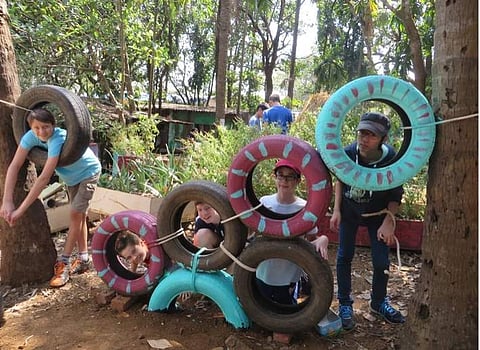

Don't you think we have been talking about integrating environmental education into the curriculum of school students more substantially for so long yet, we haven't been able to get anywhere. That's what we were thinking about when we got in touch with Sukriti Gupta who founded the Academy for Earth Sustainability (AES) in March 2015. That's half a decade of conducting extensive workshops and sessions in schools, in over 50 schools and about 1,000 workshops to be precise. Of course, the pandemic has put a full stop to their outdoor activities, but that doesn't mean that their activities will never happen and they won't follow through on the mission that they started on, which is to build sustainable communities and spark conversations around the environment.
Currently, Mumbai-based AES has resorted to conducting webinars online. They have also compiled a list of online games, like those on waste management, for students to play. "The tactile feeling of being in a forest or seeing nature is being missed thoroughly. Kids can watch a polar bear, whale or tiger in a documentary, but when they see a tiny frog outside their screens, the reaction is different. And even though the frog might be tiny, the wonder of seeing it alive evokes a different reaction which cannot be replicated," explains Sukriti. But that doesn't mean they don't make the most of what is available to them right now, which they are doing to conduct interesting sessions online with experts.
Towards a sustainable future
What AES is looking to build, since its inception, is a model for urban sustainability. And their day-long workshops drive home the same point. They partner with different orphanages and NGOs to conduct these workshops and they have done so in schools in and around Mumbai too. Themes like carbon miles of food, farm to fork, processed food, rebuilding soil, and so on are explored via experiential, hands-on activities. These not only include the generic yet fun-filled activities like growing your own plants, harvesting crops and so on, they also have a few aces up their sleeve in terms of interesting activities. "We just understood early on that with experiential activities, children had a better recall value of the subject. Because it's like an adventure for them, an exploration," says the 34-year-old.
For example, role-playing. In the context of Aarey forest, which was under threat of felling earlier, every child got to play different stakeholders, like an adivasi, an official from Brihanmumbai Municipal Corporation and a leopard from the forest and debate about the cause. "Through our initiatives, we also started the Youth for Aarey project with Aparna Bangia, where students got together and did a live campaign and performance on Carter Road to raise awareness in 2018," says Sukriti.
Older students from class IX and X are asked to weigh their food waste and brainstorm ways of reducing wastage, almost like an investigative project. This is where concepts like design-thinking and teamwork come into the picture. They also repurposed a tire to create a tiny pond inside it and added a couple of fishes to it. Soon, the students noticed that frogs took residency and lizards and butterflies were frequent guests. Slowly, a whole ecosystem was built around the tiny lake, making it an invaluable lesson for the children to learn.
Linkng it to contemporary issues
When the controversial Mumbai Coastal Road, an eight-lane freeway along Mumbai's western coastline, was being debated recently, AES planned an activity around enlightening students about the marine biodiversity that exists on Mumbai's shores. "Even near the Juhu beach, where people assume they will only find plastic, one can find octopuses, starfishes, jellyfishes and so much more!" exclaims Sukriti. So they would take kids for a walk there along with marine biologists, come back to the classroom and discuss. Children would also be asked to map what plastic remnants they have seen, like milk packets, and link it back to how they dispose them at home. "It makes them see the direct impact of their actions," says the Hong Kong-born Sukriuti who came to Mumbai in 2013. Such activities go a long way in establishing the importance of the environment we live in. And by these initiatives, AES draws the attention of students to current environmental problems.
AES worked with Save The Children India, BKC and other organisations who, "opened their space to students to learn about sustainability and at the same time provided an enriching experience to their own students," says Sukriti. "Whether it is with the adviasis, wildlife researchers, school administrative staff, teachers or the outdoors itself — without community, outdoor education and activities cannot be meaningful. To take care of people is to take care of the Earth and vice versa," she asserts and concludes.
For more on them, check out aeslife.in
